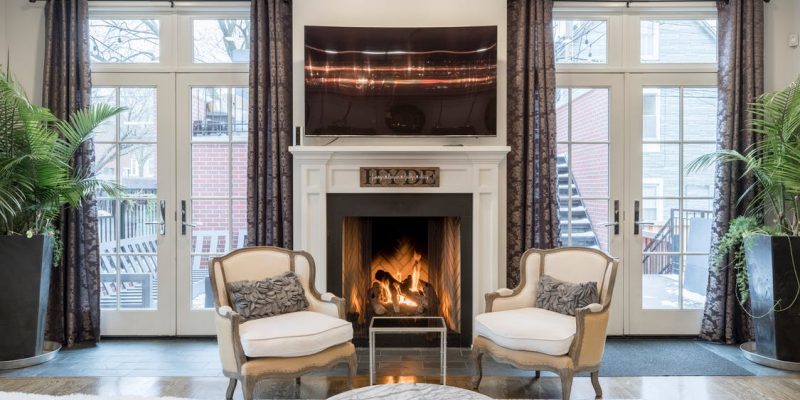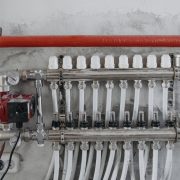When choosing a heating system for your household, two options always crop up: the furnace and the fireplace.
Some people choose the furnace, others prefer the fireplace, and others choose both! Whatever your choice is, you can rely on the pros at Anderson Air to help with installations and repair — visit https://andersonair.com/service-areas/bella-vista/ to learn more .
So, gas fireplace vs furnace, which heating option is better for your home?
Let’s discover the answer.
What is a furnace?
This is a modern and efficient way of heating up larger spaces.
The furnace is part of the HVAC system that produces and distributes heat evenly throughout all rooms of a house/building using its duct system.
Just like an air conditioner, a furnace has become an essential component of many households, ensuring that the occupants in a home enjoy comfortably warm temperatures during chilly and freezing weather.
What is a fireplace?
Since the time of the memorial, a fireplace has been the original warmth provider of most American homes. It has been the main heat source on cold nights and during the winter season for centuries.
Traditional fireplace models used wood to produce heat. The burning of wood comes with many risks, like smoke inhalation, ash, soot, and poor indoor air quality. And because of this, cleaner and more efficient fireplaces in the name of gas fireplaces were made.
Gas fireplaces provide a bigger/larger flame. But this means that they use more energy or fuel to produce more light, thereby producing lesser heat. So, although gas fireplaces are more energy-efficient than their wood counterparts, they still fall beneath furnaces.
Fireplace vs furnace: Which is better for you?
This depends on many factors, as we discuss below:
The size of the house
If you live in a single room home, a gas fireplace is the better option. It is more efficient in heating up a single/central room. On the other hand, the furnace is efficient in heating more than one room (i.e. the whole house), making it suitable for an entire home.
Cost of installation, maintenance, and repair
Furnace vs fireplace concerning costs — gas fireplaces win this round!
Furnaces are not for the faint-hearted! You enjoy the warmth they provide at a costly sum. To install one, you will likely use about $2,000 to $7,000 for the electric models and a minimum of $10,000 for the gas furnace. You also have to consider their monthly energy costs (electricity or gas) and regular repair and maintenance costs.
On the other hand, cost-wise, fireplaces are cheaper. It takes about $1,000 to $6,000 to install. An electric fireplace costs a lot less than a gas fireplace. This is because the gas fireplace will need the installation of a gas line, ventilation, and other considerations. But overall, it is cheaper than the furnace in the long run.
Safety
Generally, furnaces are safer.
Most fireplaces, especially wood-burning fireplaces, are less safe. They cause indoor air pollution. As a result of burning wood, smoke, soot, and ash are emitted. The house occupants breathe the ash and smoke, endangering their health. At the same time, the creosote byproduct that builds up over time in the chimney can lead to house fires, endangering lives.
Heating efficiency
The furnace is way more efficient than the fireplace when it comes to heat output. This is because they circulate air more evenly and have lesser heat loss.
On the other hand, fireplaces suffer from a lot of heat loss through the chimney and can only efficiently heat one room where they are located. Also, fireplaces have a temperature that they cannot go above. They usually increase a room/house temperature by 15 to 25 degrees Fahrenheit. So, they cannot provide sufficient heat during freezing winters.
Lifespan/Durability
Fireplaces have a longer lifespan than furnaces.
The average life of fireplaces is 30 years,
while that of furnaces is 15 to 20 years. This is if both of them are properly installed and routinely inspected and maintained. Also, large furnaces have a shorter lifespan than their smaller counterparts.
Aesthetics and Ambience
Gas fireplace vs furnace via aesthetics, fireplace wins.
Although the furnace ensures that a room is sufficiently heated, it adds nothing to the room’s look. On the other hand, a fireplace adds warmth to a space. It creates a cozy and charming atmosphere in a room or home.
Reliability
Gas fireplace vs furnace in terms of reliability. The furnace wins this round.
The low temperatures in winter cause pipes (water pipes, ac pipes, drainage pipes, and so on) in a household to freeze. A furnace can avert/prevent frozen pipes in a home. It efficiently distributes sufficient heat throughout the whole house, preventing pipes from freezing.
In contrast, a gas fireplace can neither supply sufficient heat nor distribute heat throughout the whole house to prevent frozen pipes. And this can lead to costly repair when pipes become frozen.
The benefit of using both a furnace and a fireplace
You will utilize the maximum heating efficiency of both systems. How?
A furnace is the central heating system that heats the whole house. Although it efficiently burns gas at a higher temperature than the fireplace, the heat has to travel through a system of ductwork to be distributed to all house rooms. This means that rooms nearer the furnace will have more heat than those further away.
This is where your gas fireplace ensures a balance of heat reception in every room. Although a gas fireplace burns gas at lower temperatures, its heat goes directly into a room.
So, to maximize heat efficiency, put the furnace at a lower temperature and, at the same time, turn on the fireplaces in rooms that are furthest from the furnace to warm them up.
Conclusion
Although fireplaces cost less during their lifespan, they cannot provide sufficient heat and very high temperatures if needed in freezing temperatures. And if you consider their other risks, they are not your best heating option.
So, in this battle, the furnace is the better heating option. Its heating efficiency (providing high and low heat levels for the whole home) outweighs its cost.
But in the case that you love fireplaces for the ambience they provide, you can use them as your supplemental heating system.




















